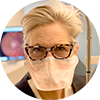Download PDF

As I write, the medical, financial, and administrative issues related to the SARS-Cov-2 pandemic are dominating our thoughts and our professional and personal lives. A magazine format isn’t designed for the daily updates necessitated by a briskly evolving pandemic, but it is a great format for education, a summary of the evidence, discussions of clinical practice, and—most uniquely—reflection. I’m writing from my sofa during a multiday spell of being homebound except for seeing a few patients with urgent ophthalmic issues. I’ll share a few observations about our ophthalmology community and some lessons learned during this challenging time.
First, the Academy has demonstrated extraordinary early leadership: Since Jan. 28, it has provided detailed information about the coronavirus. The Academy’s COVID-19 webpages are updated daily and provide scientific material, current statistics, and practice recommendations. Examples of the latter have included information on triaging patients (both those at low and high risk of infection), postponing elective surgery, and disinfection protocols. Make sure you bookmark aao.org/coronavirus.
Clear communication is essential at this time. Our patients need guidance about whether to keep an appointment for an eye exam or a surgical procedure. Practices have responded to the pandemic by messaging patients in a variety of ways: through appointment reminders, call center staff, signs, our websites, and articles in local newspapers. Many of my partners personally called their patients to explain why an appointment was being rescheduled or, conversely, why it was necessary to keep an appointment. When I called a 60-year-old glaucoma patient, she said, “Thank you so much for telling me what I should do. I didn’t know if my glaucoma checkup could wait until summer, and I’m glad you decided for me.”
Our employees also crave constant communication. They need protocols, accurate scientific information, and protective equipment. Employees are worried, not only about their exposure risk, but also whether they will be able to continue working. Many of our hourly employees need every dollar for rent, groceries, and childcare. Being as clear as possible about paid time off and financial support goes a long way in diminishing anxiety. Most of all, our employees need to know that we are a team and that their employer cares about their physical, mental, and financial well-being. It helps to communicate daily, even when we don’t know all the answers (which is usually).
I’m also reminded that ophthalmologist colleagues around the world are my friends. Talal Hrout, a comprehensive ophthalmologist in Amman, Jordan, and I have shared thoughts about which patients should be rescheduled. And on March 18—the day that David Parke announced the Academy’s recommendation that U.S. ophthalmologists only see patients with urgent ophthalmic needs—several support mechanisms kicked into gear. For instance, the owners of several ophthalmology groups messaged one another about how to manage the finances of an extended shutdown. While one ophthalmologist was quarantined with a fever, awaiting the results of COVID testing, her ophthalmology friends checked on her every day. Sidney Gicheru led a discussion group for ophthalmologists on Facebook; a Google Group helped ophthalmologists share strategies and information; and on Instagram, several of you made me laugh with photos of your attempts to work at home with kids in the background. One person sent a daily text with a COVID-related joke or cartoon (yes, there is humor during crisis). At a time when I hardly see another person, I’m supported by a community of people who share similar challenges and values.
And I think of my ophthalmology partners at Wheaton Eye Clinic as my brothers and sisters. We’ve worked together for decades. We know one another’s strengths and foibles. Our life’s work—indeed, our purpose for living—is intertwined, along with our financial outlook. I’m not surprised by the dedication of my partners, but I’m inspired anew by it.
We talk about the ophthalmologist-led eye care team. In a time of crisis, ophthalmologists in private practice and academic departments are leading, yet again, with courage, thoughtfulness, and ahead-of-the-curve strategizing. You are my people.